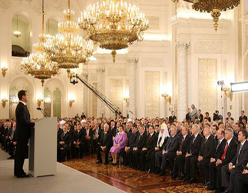President lays out overtly ambitious plans for Russia’s development in a state-of-the-nation address

KREMLIN, Moscow — Russian President Dmitry Medvedev laid out a broad program on ways and means to comprehensively reform and modernize the country in his second State-of-the-Nation Address to a joint session of the Russian parliament that drew applauses 65 times fr om the audience and accolades across the country.
The speech, a full copy of which is currently available on the Kremlin site, is an elaborate form of the president’s article, “Go Forward, Russia!” published two months earlier, where the head of state sought active and constructive inputs from all members of the society into this year's State-of-the-Nation Address and his longer-term strategic programs to reform the post-communist state.
Expectedly, the president's speech, which ran for 100 minutes in the Kremlin’s ornate St. George Hall with all the Russian political, business, social and religious elites in attendance, touched on all facets of society life, ranging from social, political, to economic issues, which the head of state said need to be urgently addressed today as well as a myriad of other longer-term development policies and strategies that are aimed at disengaging Russia from its worryingly increasing oil- and other raw-materials-dependent model of economic development, overhauling the aging industrial base that was inherited from the Soviet state and a complete transformation of the country.
The ultimate goal of these missions, the president said, is to lift Russia into global prominence in the postcrisis era, raise the overall life standards in the country and make it one of the most comfortable places of habitat on earth for its citizens. Among the most notable novelties in the speech were the president’s call for liberalization of the electoral laws to make public elections fairer and more representative of the electorate’s wills, an outline of measures to tackle the highly volatile North Caucasus region, steps to rein corruption in state agencies, etc.
Commenting on the State-of-the-Nation Address and its impacts on the Russian political future, some analysts noted the fact that some of the measures outlined in the speech have delivery deadlines far extending beyond the president’s current term speaks of his intention to personally oversee their realization, and hence a probability that he might run for a second term.
Alternatively, these longer delivery timespans of some of the set objectives, the experts continued, probably stemmed from the strategic character of the tasks facing Russia, their scales and scopes, and finally, the exact timeframes the Kremlin strategic policies experts think would be needed for their practical, and more importantly, successful realization. In this case, it is totally irrelevant who will be at the helms of affairs in the country after 2012, when the new presidential election is scheduled, the experts added.












 Web design,
Web design,